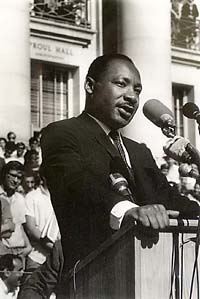A
historic photograph of Dr. Martin Luther King, Jr., speaking
out against the Vietnam War on the steps of UC Berkeley's
Sproul Hall 35 years ago, came home today to hang in the Berkeley
student union named in his honor.
The
new 24-by-36-inch black-and-white framed photograph, taken
on May 17, 1967 by photographer Helen Nestor, will hang in
the main stairwell of the Martin Luther King Jr. Student Union
leading up to Pauley Ballroom.
 |

Martin
Luther King, Jr. speaking on Sproul Plaza. Helen Nestor
photo. |
At
a May 17, 2002 Convocation Day event, Nestor returned to the
campus for an event in which Berkeley's incoming student body
president Jesse Gabriel accepted the gift of the photograph.
"It was a warm and special feeling to photograph him,"
said Nestor, who has polio and was allowed to photograph Dr.
King at closer range than other photographers because of her
physical disability. "The students were very charged
up and very much with Dr. King. It was a special time."
During
King's 1967 speech on the steps of Sproul Hall, the civil
rights leader told students: "You, in a real sense, have
been the conscience of the academic community and our nation."
A gold plaque with King's name and that quote will be hung
below the photograph.
"We
are very honored to have this photograph," said Gabriel,
a junior economics major, who accepted the gift on behalf
of the UC Associated Students.
Berkeley's
student union did not become the Martin Luther King, Jr. Student
Union until February 1985, more than 17 years after King's
anti-Vietnam War speech at Berkeley. Ronald Stevenson, who
was then a Berkeley undergraduate majoring in ethnic studies
with an emphasis on civil rights, had proposed the idea. Stevenson,
now director of a Berkeley mentoring program called Break
the Cycle, presented his idea to then-Chancellor Ira Michael
Heyman and professor Charles Henry, who is currently chair
of African American Studies.
"It
took two years of work to get the name change accomplished,"
Stevenson said. "The chancellor said he'd push it through
with the regents if I would push it through with the students."
Previously,
the only image of King in the student union was a rendering
on cardboard tacked to a bulletin board. When Free Speech
Movement Café curator Harold Adler saw this, he knew
something needed to be done.
Adler,
co-curator of a book and exhibit about the social protest
movements in the '60s and '70s, had the one and only copy
of Nestor's photograph. He showed it to Henry, who arranged
to have the African-American Studies department buy a copy
to present to students.
"One
of the many wonderful things King said was that the university
[UC Berkeley] was a great world university, and that many
people came for that reason, so this was a basis for free
speech," said Adler. "Our legacy of the 1960s is
what we have left, what remains….so these photographs,
of King, of all of the other activists of the '60s and '70s,
are so important."